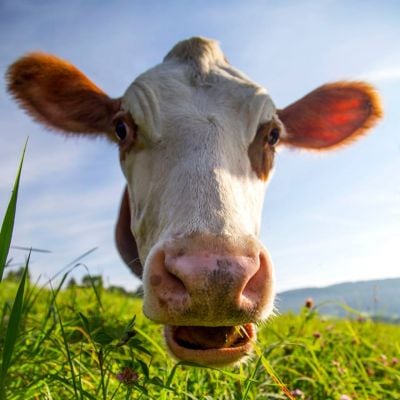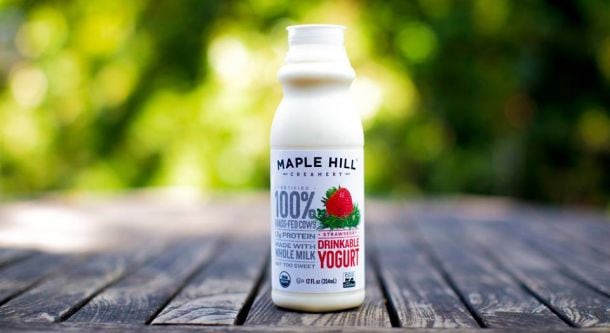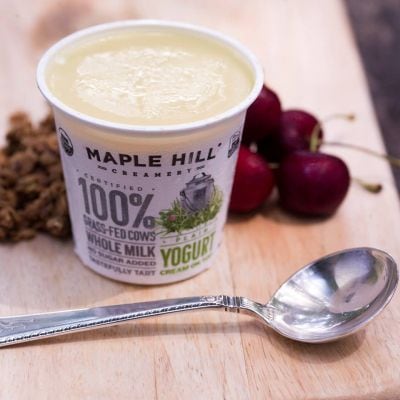Founding farmer and CEO Tim Joseph told FoodNavigator-USA: “Consumers write my paycheck so they will decide what to buy, but I do get frustrated when I hear people make assumptions about what’s more environmentally-friendly [eg. dairy vs ‘plant-based’] as not all dairy is the same, and there are so many benefits to grazing.
"Even among natural and organic consumers, the level of ignorance around agriculture is astounding. Everyone knows just enough to be dangerous.
"Big monocrops of soy or other plants [that are used in some dairy alternatives] still need inputs (fertilizers, pesticides etc) whereas our ‘inputs’ are grazing - manure from the grazing cows, and we’re regenerating the soil, supporting wildlife biodiversity, sequestering carbon and limiting pollution of waterways."
100% grass-fed dairy cows have a longer, healthier life than their conventionally-fed counterparts
As for differences between different dairy farming methods, Maple Hill's 'closed loop' model - whereby cows eat grass from pasture and baleage and spend most of their time on pasture -“bypasses the considerable resources used produce the corn, soybeans, or grains” fed to conventionally-raised dairy cows (grass-fed cows produce manure, which feeds the soil that grows the grass they eat), he added.
Its 100% grass-fed dairy cows also have a longer, healthier life than their conventionally-fed counterparts, he claimed: “Our cows [Maple Hill procures milk from 100 farms in the New York State area] enjoy daily access to the outdoors all year round, and are generally only in the barn for milking time.
"They socialize with their herd mates, and are less stressed and happier than cows in CAFOs [concentrated animal feeding operations] or even large organic dairy farms. In the winter they eat hay [dried grass] and baleage [fermented, high-moisture grass], so they are 100% grass fed.”

Maple Hill Creamery's 100% grass-fed cows typically live "at least twice as long as conventional dairy cows, and have fewer health issues," claims the company.
Without a third-party certification, consumers cannot be certain of how much grass the cows actually are consuming
As the term ‘grass-fed’ is not legally defined by the FDA, however, and USDA organic certification only guarantees that dairy cows have access to pasture/forage for 30% of the year, no two grass-fed claims are the same, which is misleading consumers and creating an uneven playing field, he claimed.
“Without a third-party certification, consumers cannot be certain of how much grass the cows actually are consuming, which is why we’ve worked with PCO [organic certifier Pennsylvania Certified Organic] to develop standards for 100% grass-fed and we’re working with other brands in this space such as Organic Valley via the American Grassfed Association to get some standards in place. We could have gone to the FDA first but if you go down that route things move so slowly that we didn't want to wait. It's an important claim and it needs to be backed up."

Consumers think grass-fed means exclusively grass fed
But why does it matter if one 'grass fed' brand uses milk from cows eating grass for 120 days a year, and another uses milk from cows fed grass 365 days a year?
For a start, because the milk will vary across the year, said Joseph (grass-fed milk has higher levels of beta-carotene and CLA (conjugated linoleic acid), a higher ratio of omega-3 to omega-6 fatty acids, and a different, earthier, flavor.
"The cow is making milk every day, so the production system should involve grass every day.

“In beef you see this 'grass-fed, grain-finished' claim, which is a bit disingenuous because it just puts a new name on the current system and doesn’t change the system or improve animal welfare, it bugs the heck out of me."
Consumers, meanwhile, think ‘grass-fed’ means exclusively grass-fed, he said. “We recently did some focus groups and something like 80% of people thought this. There was a strong feeling that cows should not be eating grains and corn, which really surprised me, as I don't think you would have heard that a couple of years ago.
"They also had this very strong sense that we need to go back to doing things the way they used to be done, the way they should be done, and that grass fed means healthier, happier cows, which that means healthier milk, even if they don’t have a detailed understanding of what that means [in terms of the milk’s composition].”
A strong regional supply, a national brand footprint
But how easy is it to procure grass-fed milk for his products (which he originally made in-house but now manufactures via a network of co-manufacturers)?

New farmers Joseph is working with typically fall into three categories, he said: First, new generation dairy farmers; second, conventional farmers that want to transition to grass-fed in part because of the volatility of regular milk pricing; and third, organic farmers that have seen their margins suffer owing to the high price of securing non-GMO feed for their cows.
“We want to build a strong regional supply with a national brand footprint.”
Retailers are looking for more grass-fed dairy products
So are retailers enthused by the grass fed dairy opportunity?
Yes, said Joseph, who sold a minority stake in Maple Hill to Sunrise Strategic Partners in November in order to raise cash and tap into the expertise of the management team there, which is led by former Boulder Brands executive Steve Hughes.
While not all retail buyers are as engaged as Joseph is by the debate over 'grass-fed' claims, that may change as consumers become more educated about what grass-fed means, and actively seek out 100% grass-fed products, he predicted.
"Grass-fed is definitely opening doors for us, so we want to grow our footprint and also go deeper [add more SKUs] with existing customers. We've been generating 60-100% growth year on year, which is pretty exciting.
"We have a strong base in natural and organic retailers but we've also been growing a lot in conventional because Maple Hill attracts higher spending consumers and retailers want those higher value baskets."
